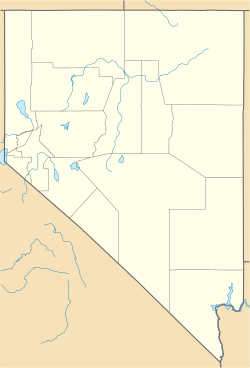Cottonwood Island (Nevada) facts for kids
| Geography | |
|---|---|
| Location | Colorado River |
| Coordinates | 35°25′08″N 114°38′13″W / 35.41889°N 114.63694°W |
| Length | 10 mi (20 km) |
| Width | 3 mi (5 km) |
| Administration | |
|
USA
|
|
| State | Nevada |
| County | Clark County |
| Demographics | |
| Population | 0 (1869) |
Cottonwood Island was a large island in the Colorado River. It was located in Cottonwood Valley, within Clark County, Nevada. This island was quite big, about 10 miles (16 km) long and up to 3 miles (4.8 km) wide.
The island was covered with cottonwood trees. After spring floods, it would collect lots of driftwood. This driftwood came from forests along the upper Colorado River. It would wash down and get caught in the wide valley where the river slowed. Cottonwood Island was very important. It provided wood and fuel for steamboats that traveled the river. It also supplied wood for early mills and mines in El Dorado Canyon.
In 1869, a traveler named John Ross Browne described the island. He noted that it was a "fine, level island" with fertile land and lots of grass. He also mentioned the "considerable timber" on the island. Browne wrote about the huge amount of driftwood that collected there. This wood was mainly pitch-pine and cedar. He thought there were thousands of cords of wood, enough to fuel steamboats for years. The top part of the island seemed to be made of tree trunks and sand.
Cottonwood Island appeared on important maps. It was shown on an 1875 map by Lt. G. M. Wheeler. It also appeared on a 1911 reprint of a U. S. Geological Survey map.
Contents
History of Cottonwood Island
Cottonwood Island was a special place for the Mohave people. They used the island for farming. Their crops depended on the spring floods for water. The Mohave also made things from the cottonwood trees. The island was sometimes a source of disagreement. This was with the ChemehueviPaiute people to the north and west.
Wood for Mines and Steamboats
The driftwood on the island became a valuable resource. This happened after mines opened in El Dorado Canyon in 1861. The Mohave people would cut the wood. They sold it as fuel to steamboats passing by. They also provided timber for the mines.
Steamboats could only travel this part of the river during high water. This was because of rapids and shallow areas. By late 1863, steamboats didn't come as often. This was because less ore was being shipped downriver. Also, the mines needed more regular supplies of wood and fuel.
Barges and Trade Routes
To solve the supply problem, Captain L. C. Wilburn started a barge service. He had three barges: the Colorado, El Dorado, and Veagas. These barges were sailed and poled by Paiute and Mohave crews. They operated during the months when the river was low.
The barges carried important goods. They brought hay, timber, wood, and charcoal. This charcoal was made on the island. They carried these supplies upriver to the mills. The trip usually took three or four days. The barges also traveled further up the Colorado River. They went as far as the Virgin River. There, they picked up salt from Mormon colonists. This salt was used at the mills to help refine the ore.
Cottonwood Island Today
Today, Cottonwood Island is no longer visible. It is now covered by the waters of Lake Mohave.
See also
 In Spanish: Isla Cottonwood para niños
In Spanish: Isla Cottonwood para niños
 | Lonnie Johnson |
 | Granville Woods |
 | Lewis Howard Latimer |
 | James West |


